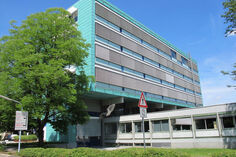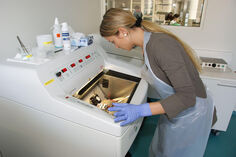MEDICAL BIOINFORMATICS
Comprehensive molecular profiling using next generation sequencing (NGS) and -omics technologies has revolutionized medical research and is increasingly used in clinical diagnostics. Our group conducts translational cancer research based on the systems medicine paradigm of comprehensive molecular profiling. We develop models, methods and software for the analysis of molecular high-throughput data and integration of heterogeneous data such as different layers of -omics data, histomorphological/immunohistochemical data, clinical data and biological knowledge. Currently active research field include:
• Genomic biomarkers: We develop genomics scores to detect deficiency of specific DNA repair systems including homologous recombination repair deficiency (HRD), mismatch repair deficiency (MMRD), proof-reading deficiency (PRD) and others.
• Tissue biomarkers: We develop diagnostic, prognostic, and predictive biomarkers for therapy guidance for example in immuno-oncology.
• Digital pathology: We apply artificial intelligence (AI) and neuronal networks to analyze histopathological slides and spatial -omics data.
• Implementation science: We develop and implement bioinformatic pipelines for the analysis and clinical interpretation of NGS data.
Typical research questions we are tackling include the following: How can measurement of complex biomarkers such as tumor mutational burden (TMB) be optimized and introduced into clinical practice? Why do some tumors respond to specific therapies (e.g. immune therapy), while other tumors do not respond and how can therapy resistance being overcome? How can a specific histopathological pattern (e.g. tumor cell budding or tertiary lymphoid structures) be detected, what are the underlying molecular alterations and mechanisms, and how can these be exploited by therapeutic targeting?
We are responsible for operation and expansion of the IT infrastructure of the Heidelberg Molecular Pathology Center (Molekularpathologisches Zentrum, MPZ).
SOFTWARE
Cutoff Finder: Analysis and optimization of biomarker cutpoints (web app paper)
Ioncopy: Calling of copy number alterations from panel sequencing data (web app R package papers)
Ionflows: Estimation of the number of flows needed for semiconductor sequencing (R package paper)
Cancerclass: Implementation of the multiple random validation protocol for cancer classification (R package paper)
Our software is for research use only. While we test our software as careful as possible, we cannot accept any liability in case of possible errors. We are grateful for bug reports and will improve the software accordingly.
FUNDING
National Center for Tumor diseases, Heidelberg (NCT)
German Cancer Aid (Deutsche Krebshilfe, DKH)
Center for Personalized Medicine (Zentrum für personalisierte Medizin, ZPM)
TEAM
Head
Prof. Dr. rer. nat. Jan Budczies (Pubmed)
Research scientists
Dr. sc. hum. Susanne Beck (Pubmed)
Dr. rer. nat. Michael Menzel (Pubmed)
Dr. rer. nat. Markus Ball (Pubmed)
PhD students
Dipl.-Phys., Dipl.-Math. Klaus Kluck (Pubmed)
M.Sc. Bioinf. Iordanis Ourailidis (Pubmed)
M.Sc. Bioinf. Eva Romanovsky (Pubmed)
System administrator
M.Sc. Bioinf. Fabian Schnecko





